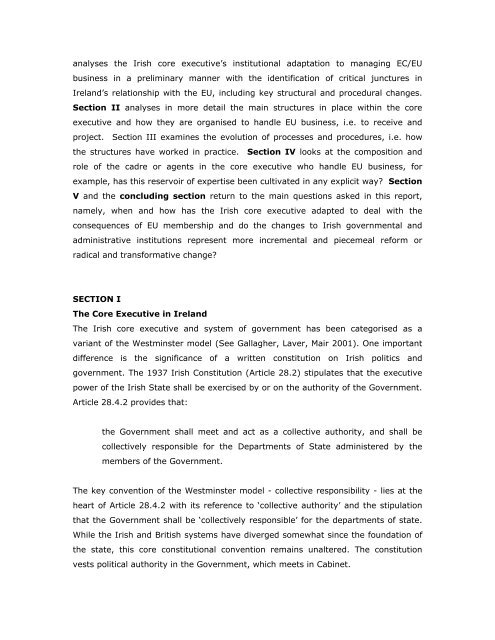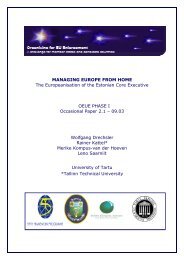Managing Europe From Home: The Europeanisation of the Irish ...
Managing Europe From Home: The Europeanisation of the Irish ...
Managing Europe From Home: The Europeanisation of the Irish ...
Create successful ePaper yourself
Turn your PDF publications into a flip-book with our unique Google optimized e-Paper software.
analyses <strong>the</strong> <strong>Irish</strong> core executive’s institutional adaptation to managing EC/EU<br />
business in a preliminary manner with <strong>the</strong> identification <strong>of</strong> critical junctures in<br />
Ireland’s relationship with <strong>the</strong> EU, including key structural and procedural changes.<br />
Section II analyses in more detail <strong>the</strong> main structures in place within <strong>the</strong> core<br />
executive and how <strong>the</strong>y are organised to handle EU business, i.e. to receive and<br />
project. Section III examines <strong>the</strong> evolution <strong>of</strong> processes and procedures, i.e. how<br />
<strong>the</strong> structures have worked in practice. Section IV looks at <strong>the</strong> composition and<br />
role <strong>of</strong> <strong>the</strong> cadre or agents in <strong>the</strong> core executive who handle EU business, for<br />
example, has this reservoir <strong>of</strong> expertise been cultivated in any explicit way Section<br />
V and <strong>the</strong> concluding section return to <strong>the</strong> main questions asked in this report,<br />
namely, when and how has <strong>the</strong> <strong>Irish</strong> core executive adapted to deal with <strong>the</strong><br />
consequences <strong>of</strong> EU membership and do <strong>the</strong> changes to <strong>Irish</strong> governmental and<br />
administrative institutions represent more incremental and piecemeal reform or<br />
radical and transformative change<br />
SECTION I<br />
<strong>The</strong> Core Executive in Ireland<br />
<strong>The</strong> <strong>Irish</strong> core executive and system <strong>of</strong> government has been categorised as a<br />
variant <strong>of</strong> <strong>the</strong> Westminster model (See Gallagher, Laver, Mair 2001). One important<br />
difference is <strong>the</strong> significance <strong>of</strong> a written constitution on <strong>Irish</strong> politics and<br />
government. <strong>The</strong> 1937 <strong>Irish</strong> Constitution (Article 28.2) stipulates that <strong>the</strong> executive<br />
power <strong>of</strong> <strong>the</strong> <strong>Irish</strong> State shall be exercised by or on <strong>the</strong> authority <strong>of</strong> <strong>the</strong> Government.<br />
Article 28.4.2 provides that:<br />
<strong>the</strong> Government shall meet and act as a collective authority, and shall be<br />
collectively responsible for <strong>the</strong> Departments <strong>of</strong> State administered by <strong>the</strong><br />
members <strong>of</strong> <strong>the</strong> Government.<br />
<strong>The</strong> key convention <strong>of</strong> <strong>the</strong> Westminster model - collective responsibility - lies at <strong>the</strong><br />
heart <strong>of</strong> Article 28.4.2 with its reference to ‘collective authority’ and <strong>the</strong> stipulation<br />
that <strong>the</strong> Government shall be ‘collectively responsible’ for <strong>the</strong> departments <strong>of</strong> state.<br />
While <strong>the</strong> <strong>Irish</strong> and British systems have diverged somewhat since <strong>the</strong> foundation <strong>of</strong><br />
<strong>the</strong> state, this core constitutional convention remains unaltered. <strong>The</strong> constitution<br />
vests political authority in <strong>the</strong> Government, which meets in Cabinet.



